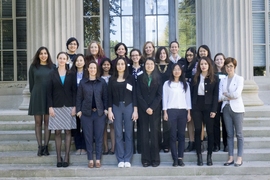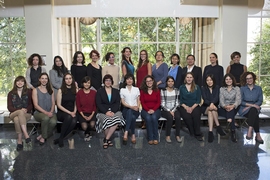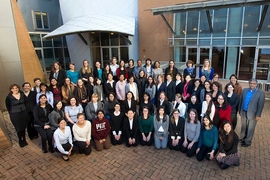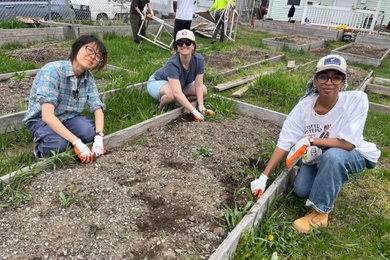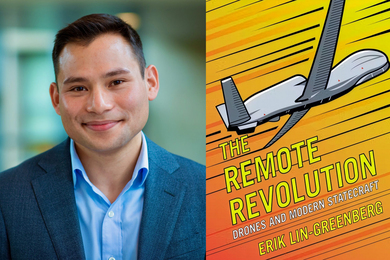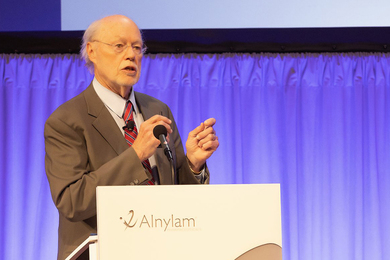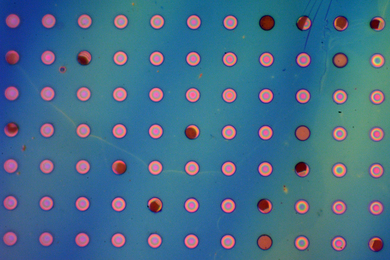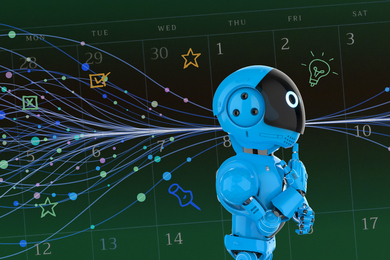For women in engineering, getting ahead sometimes means trying to be “one of the guys.” That’s why Margarita Paz Castro says she enjoyed attending Rising Stars in EECS, a workshop held recently at MIT for women interested in academic careers in electrical engineering and computer science.
“It’s very empowering being surrounded by women,” said Castro, who earned a master’s degree in Chile before moving to the University of Toronto to do PhD research on discrete optimization problems. “I like to see role models.”
Designed to help graduate students and postdocs navigate the early stages of an academic career, the Rising Stars workshop provided participants with practical information and candid advice on seeking and interviewing for faculty jobs, networking, teaching, speaking, mentoring, funding research, setting up labs, getting tenure, and managing day-to-day life in academia.
“This is an easy, compact way to get information you can’t get anywhere else. It’s been fabulous,” said Orianna DeMasi, a PhD candidate at the University of California at Berkeley, who is working on an application for machine learning for medicine. “I liked the transparency about the process and the idea that they want everyone to succeed.”
Founded in 2012 by MIT’s Department of Electrical Engineering and Computer Science (EECS), the workshop has more than doubled in attendance over the years. The 76 women chosen to participate this year were selected from a pool of more than 240 applicants, represent 20 different research areas, and hail from 30 universities and organizations in the United States and several other countries.
“You should be very proud. Be super-confident,” Stefanie Mueller, the X-Career Development Assistant Professor in EECS at MIT, said in her opening remarks. Mueller, one of the workshop’s four technical co-chairs, spoke on applying for jobs and moderated a panel on research.
“Past Rising Stars have been very successful,” said Asu Ozdaglar, the School of Engineering Distinguished Professor of Engineering and EECS department head, who served as workshop chair. She noted that more than 30 percent of Rising Stars in EECS alumni hold faculty positions (including four at MIT), and another 20 percent work in industry; of the rest, the majority are still students or postdocs.
Anantha P. Chandrakasan, the Vannevar Bush Professor of Electrical Engineering and Computer Science and dean of MIT’s School of Engineering, joined Mueller and Ozdaglar in welcoming attendees to the workshop. Chandrakasan, who founded Rising Stars when he served as head of EECS, noted that in recent years the workshop has been hosted by Stanford University, Carnegie Mellon University, and UC Berkeley. “We’re very excited that this has gone national,” he said.
The Rising Stars concept has also begun expanding to other fields. At MIT, there are now similar programs in aeronautics and astronautics, biomedicine, chemical engineering, civil and environmental engineering, mechanical engineering, and nuclear science and engineering, Chandrakasan said.
This year’s Rising Stars in EECS, held Oct. 28-30, began with a Sunday night dinner and reception, included two days of talks by more than 40 panelists and speakers, and featured a banquet at the MIT Museum. A workshop highlight was a poster session that gave attendees a chance to pitch their research to faculty.
Niranjini Rajagopal, a PhD candidate at Carnegie Mellon, for example, presented her work on “A Sensor Fusion Approach to Indoor Localization.” She said it was a nice change to discuss her work with an audience of engineers outside her narrow specialty. “It’s also nice to see what everyone else is working on,” she said.
In general, the workshop centered on topics that would have been equally relevant to male academics, such as “How to Apply for Faculty Jobs,” “Teaching,” and “Mentoring Students.” However, at several points the special challenges women face became apparent.
One attendee told a story of facing pushback from a male student who persistently challenged her grasp of the material she was teaching. Another said she noticed a woman who was doing well in her class left when the only other woman enrolled dropped out.
Anette “Peko” Hosoi, associate dean of engineering and the Neil and Jane Pappalardo Professor of Mechanical Engineering at MIT, said she has faced similar situations. For instance, she once met with a male student who had not done well on an exam in her mechanics class. He admitted being embarrassed by his performance, saying: “I even looked at the person next to me and realized I got beat by a girl.”
Ideas for addressing such challenges varied. Professor Randall Davis of EECS and the Computer Science and Artificial Intelligence Lab (CSAIL), who gave a talk on “How to Speak,” fielded the question about the male student who challenged his professor in class. Davis suggested firmly ending the discussion with a redirect to the day’s material. “People have said women get ignored. I think a little subtle pushback is warranted,” he said.
“Being visible is really important,” said Hosoi, who gave a talk on teaching. “When Mary Boyce was head of mechanical engineering, she selected women to teach the intro mechanics class,” ensuring that men get used to women faculty early on.
Being in the minority can have its perks, however. “Sometimes, as women, it’s an advantage that we’re rare in our departments,” said Jaime Teevan, chief scientist for Microsoft Experiences and Devices and affiliate professor at the University of Washington, who moderated the panel discussion on career trajectories. “At cocktail parties, people will remember your name because there are not many women there.”
Speakers also noted that female faculty are often flooded with requests to serve on committees and as conference organizers, because they provide diversity. “I was asked to be on conference committees five to 10 times a year. Male colleagues were maybe on one,” said Virginia Vassilevska Williams, the Steven G. (1968) and Renee Finn Career Development Associate Professor in EECS and a Rising Stars technical co-chair. Williams moderated a panel on search committees and the “Toward Tenure” discussion.
Choosing which commitments to prioritize comes with the job, faculty members said.
“I think academic jobs are associated with learning to say ‘no’ a lot,” said Polina Golland, the Henry Ellis Warren (1894) Professor of EECS and a CSAIL principal investigator, who worked with Chandrakasan to launch the first Rising Stars workshop in 2012. She participated in a session titled “Words of Wisdom” with four other leading MIT professors of EECS, including Dina Katabi, Muriel Medard, Daniela Rus, and moderator Ronitt Rubinfeld. “I recently learned the phrase ‘I regretfully decline,’” Golland said wryly. “Feel free to use it.”
The road to an academic career is not always direct, as attendees learned in the opening session on career trajectories. Ranjitha Kumar, an assistant professor of computer science at the University of Illinois at Urbana-Champaign, launched a company before going into academia. Azita Emami worked at an IBM research lab before joining the Caltech, where she is now the Andrew and Peggy Cherng Professor of Electrical Engineering and Medical Engineering.
Challenges to academic success — and happiness — include the “two-body problem” of landing a job as an academic with an academic spouse, as well as deciding when to have children and finding the right mentors, panelists and speakers said. The best way to navigate all these challenges is with a lot of support — from friends, family, colleagues, and advisors.
“Your support system is very important,” said Rus, the Andrew (1956) and Erna Viterbi Professor of EECS and director of CSAIL at MIT. “If you have support, you can have it all.”
Building that support network is what Rising Stars is all about, Ozdaglar said. She told the young women in the room: “Our hope is that this peer network that you create will support you throughout your careers.”
In addition to Mueller and Williams, the event’s technical co-chairs included EECS Assistant Professor Farnaz Niroui and Associate Professor Vivienne Sze (both alumnae of earlier Rising Stars events). Niroui moderated the job-search panel, while Sze moderated the “Toward Tenure” discussion. Ozdaglar served as workshop chair, while Chandrakasan was the workshop advisor.
Visit the Rising Stars in EECS 2018 website for bios of all 76 participants, the schedule of speakers and panelists, and links to websites for earlier workshops.








